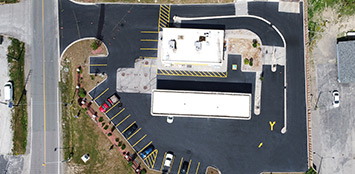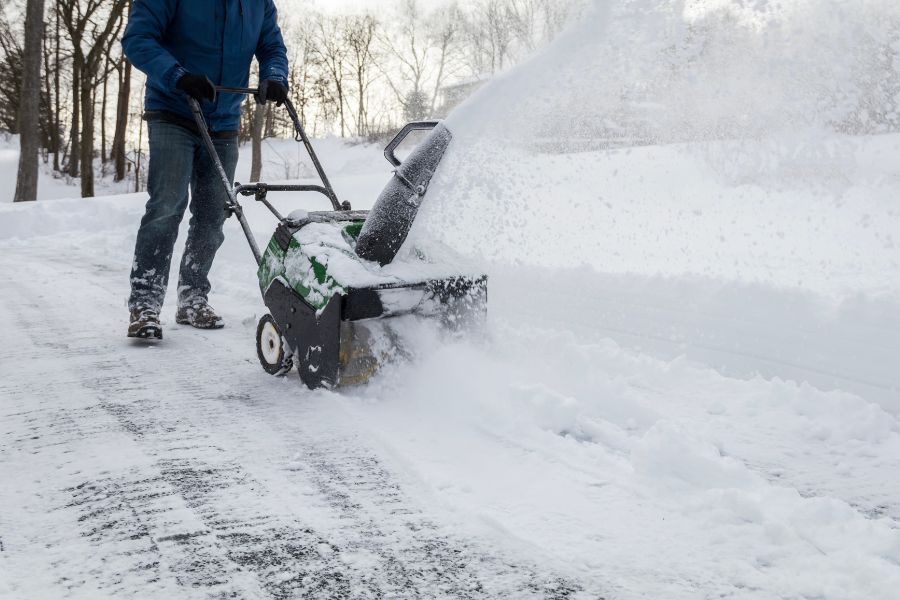Managing snow in the winter can be a difficult task. One of the most common ways to clear snow is to use salt or a snow blower. These methods are cheap, effective, and convenient. But what is their effect on asphalt and concrete surfaces?
Salt on Asphalt and Concrete Surfaces
It’s a known fact that salt is a commonly used substance for de-icing roads and sidewalks during the winter months. However, the effects of salt on asphalt and concrete surfaces can cause lasting damage if steps aren’t taken to mitigate its use.
When Asphalt is exposed to salt, these materials begin to corrode and deteriorate as the salt works its way into the surface and begins to break down the bonds that hold it together. This can lead to cracking, potholes, erosion, chip sealing failures and other problems on paved surfaces.
Fortunately, there are ways to reduce the effects of salt on asphalt and concrete. One method is to use alternative ice-melting agents such as calcium chloride or magnesium chloride instead of rock salt. These agents are less reactive than traditional salts, so they do not create as much corrosion when exposed to pavement surfaces.
Snow Blowers on Asphalt and Concrete Surfaces
A convenient tool for quickly removing snow from driveways and sidewalks during the winter months is a snow blower. However, they can cause damage to asphalt and concrete surfaces if not used correctly.
Additionally, asphalt is made up of various materials such as gravel and limestone, which together form a strong pavement surface. Snow blowers can be harmful to asphalt because the blades can chip away at the surface when used incorrectly. This can lead to cracking, potholes, chip sealing failure and other types of damage on paved surfaces.
Concrete is more durable than asphalt but still susceptible to damage from snow blowers. The blades of a snow blower can cut into the surface of concrete, causing it to chip or crack over time. To minimize damage from snow blowers, it is important to make sure that you use the correct settings for your particular machine and take care when operating it near delicate surfaces like asphalt or concrete.
Regular maintenance should be done on pavements during winter months in order to protect them from further damage caused by ice and snow accumulation. Here to protect your pavements is Asphalt Sealing, with our commercial and residential asphalt paving, you’re sure to have fewer worries in the winter.
Protect Your Driveway or Patio From Salt or Snow Blower
One of the best ways to protect your driveway or patio from damage caused by salt or a snow blower is with regular maintenance. This includes inspecting the surface for any signs of wear and tear, and addressing any problems as soon as they are identified. In addition, it’s important to make sure that salt and other ice-melting agents are used according to manufacturer recommendations. Overloading pavement surfaces with large amounts of salt can cause corrosion and damage over time.
When using a snow blower, it is important to make sure that you use the correct settings for your particular machine and take care when operating it near delicate surfaces like asphalt or concrete. It is also recommended to always depend on the manufacturers’ instructions when adding fuel, oil or other liquids to prevent possible damage due to incorrect proportions.
Finally, one of the most effective ways to protect your driveway or patio from damage caused by salt or a snow blower is to apply a sealant before winter arrives. A sealant will create an additional protective layer on top of the existing surface materials, which can help protect them from further deterioration due to ice and snow accumulation.
Hiring a Professional Is the Best Protection
In conclusion, salt and snow blowers both have the potential to cause harm if not used properly around asphalt or concrete surfaces; however, this usually only occurs when these tools are used excessively or carelessly. When used with caution and appropriate safety measures, neither tool should cause any significant damage to these types of surfaces.
As always, it’s best practice for all property owners to take extra precautions when managing snow around asphalt or concrete surfaces during cold weather months. By taking these steps you can ensure that your property remains safe from any unnecessary wear and tear throughout the winter season!
Keep your driveway and patio protected from salt and snow damage all year round with Asphalt Sealing’s valuable services. Enjoy worry-free winter months knowing that you have a trusted partner in ensuring long-lasting protection for your asphalt surfaces. Get in touch today!



